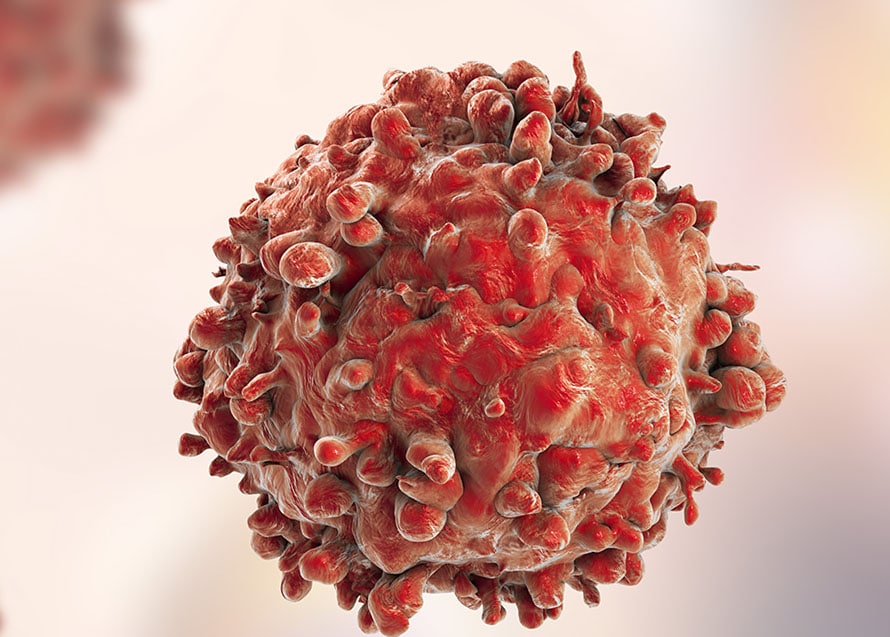Making our unique ULK inhibitors available as tools for the academic community has helped to reignite interest in blocking autophagy as a strategy for treating cancer.
It’s led to scientists at LifeArc and the University of Glasgow discovering that our ULK1 inhibitor, MRT403, could offer a way to overcome resistance to existing treatments for chronic myeloid leukaemia (CML). The study was published in Science Translational Medicine.
Autophagy – a promising approach for treating cancer
Autophagy is a cell’s recycling process, which is triggered when a cell becomes stressed. Cells can also generate nutrients and energy through this process. But cancer cells can also use this process to help them survive treatments such as chemotherapy, radiotherapy, and targeted drugs; blocking autophagy offers a promising approach for treating cancer.
ULK1 (UNC 51-like autophagy activating kinase 1) is an enzyme that plays an essential role in the early stages of autophagy – making it an attractive target for therapy.
LifeArc scientists have been at the forefront of efforts to identify compounds that target ULK, and we initially began working with Dr Ian Ganley at the University of Dundee in 2014. In 2015, we reported the first in vitro ULK inhibitors, which have since been widely used by the academic community to advance research into autophagy. Our medicinal chemists then went on to develop a series of small molecules against ULK, which were suitable for in vivo studies.
But like other groups at the time, we were unable to show that blocking autophagy using selective ULK-inhibitors could stop cancer cells growing in standard tumour models used in the lab. These disappointing results led to most commercial companies abandoning the autophagy area.
Collaborating with academia
LifeArc then began to collaborate with Dr Vignir Helgason, a researcher at the University of Glasgow, who had been investigating autophagy in leukaemia cells for many years.
And this has led to this latest paper, where they reveal how our ULK1 inhibitor, MRT403, could offer a way to overcome resistance to existing treatments for chronic myeloid leukaemia (CML).
Currently, CML patients are treated with tyrosine kinase inhibitors (or TKIs), which have transformed how the disease is treated. Although treatment with TKIs alone rarely cures the disease, it can stop it progressing.
But a small fraction of CML cells called leukaemic stem cells are resistant to these targeted drugs – and patients can relapse. As a result, they need to remain on TKIs for the rest of their lives, bringing side effects and the potential to become resistant to the drugs.
In this latest paper, Dr Helgason’s team has revealed that MRT403, when used in combination with TKIs, can stop leukaemic stem cells derived from CML patients, and in leukaemia mouse models, from growing. It’s the first inhibitor of its kind to do this in leukaemic stem cells and suggests that targeting autophagy could offer an alternative strategy for curing CML.
Broader benefits
Targeting ULK may also be a potential way to treat other types of cancer that use autophagy to dodge treatments. This has sparked renewed interest from industry in blocking autophagy as a treatment strategy for more common cancers that are caused by faults in genes in the RAS pathway.
Recently, first clinical trial for a ULK inhibitor began recruiting patients with advanced solid tumours, including pancreatic, bowel and lung cancer.
“It’s a very current area of research, there is certainly excitement and optimism in the field,” says Helgason. “The collaboration with LifeArc was effortless,” he continues. “It just worked very well because we provided the disease type and the models – and LifeArc provided the drug compounds. I’ve thoroughly enjoyed the interaction.”
Erasca (Nasdaq:ERAS), a clinical-stage precision oncology company based in San Diego, has exclusively licensed certain elements of LifeArc’s intellectual property to develop, manufacture, and commercialise ULK inhibitors. Erasca is focused on developing potent, selective inhibitors of ULK1/2 that enhance tumour cell death in combination with its RAS/MAPK pathway inhibitors.

